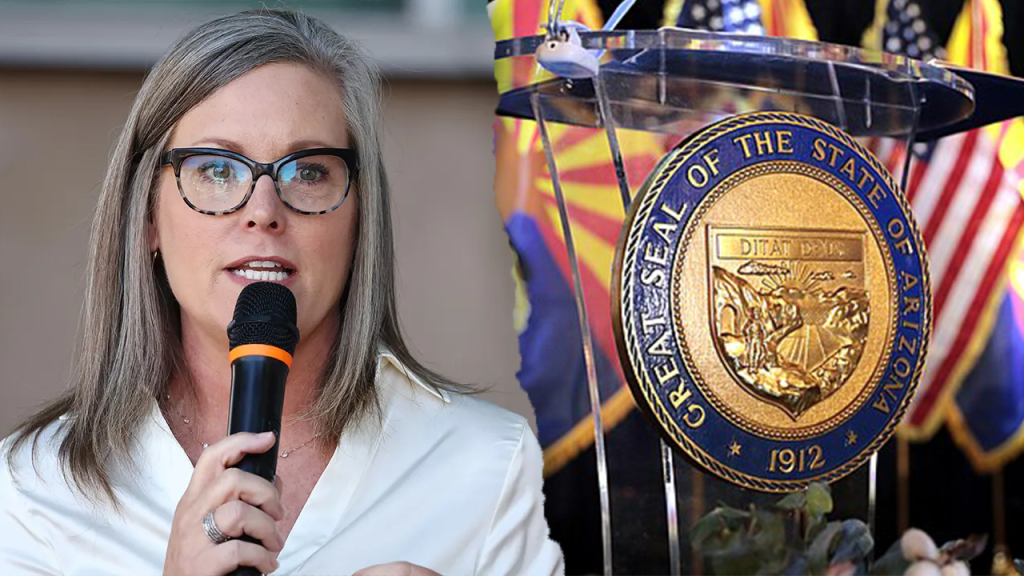Arizona Governor Katie Hobbs has made a controversial choice for her reelection campaign by hiring Michael Beyer as her communications director. Known for his disparaging remarks targeting individuals primarily based on their race, Beyer’s history raises eyebrows among political analysts and constituents alike. As the 2026 election approaches, this hire has ignited a debate about political messaging and campaign strategy within Hobbs’ camp.
| Article Subheadings |
|---|
| 1) Controversial Hiring Decision |
| 2) Beyer’s History of Remarks |
| 3) Previous Staffing Issues in Hobbs’ Office |
| 4) Public and Political Reactions |
| 5) Future Implications for Hobbs’ Campaign |
Controversial Hiring Decision
The appointment of Michael Beyer as the communications director for Governor Katie Hobbs‘ 2026 reelection campaign marks a significant shift in strategy. Many within political circles are questioning the implications of hiring someone known for incendiary comments, particularly those that have targeted individuals on the basis of their race. Katie Hobbs, who has positioned herself as a progressive leader, seems willing to embrace a more aggressive communication style, yet this decision raises concerns about the overall messaging of her campaign.
Beyer’s History of Remarks
Beyer has a long history of making controversial statements, particularly regarding race and ethnicity. For example, in a 2014 tweet, he claimed that certain groups are unified by a “belief in white supremacy.” He has gone after prominent figures like Bernie Sanders and celebrities such as Taylor Swift, calling their supporters entitled due to their race. His posts often suggest that white people romanticize historical injustices, demonstrating a strong anti-white rhetoric that could alienate potential voters.
Much of Beyer’s criticism stems from a deeply politicized view of issues like identity politics and social justice. He has proclaimed that only white evangelicals support anti-LGBTQ+ measures, a statement that positions him firmly against specific political factions. Beyer’s combative approach is somewhat emblematic of the current political climate, where polarizing views dominate the discourse.
Previous Staffing Issues in Hobbs’ Office
The choice to hire Beyer is not isolated; it follows a troubling trend of high turnover among staff within Hobbs’ administration. Reports from 2022 indicated that two-thirds of her gubernatorial campaign staff left within a five-month span, describing the work environment as “emotionally abusive.” These staffing challenges have led to questions about Hobbs’ leadership style and the sustainability of her campaign.
Furthermore, various employees have faced disciplinary actions for inflammatory social media posts, resulting in a media spotlight that has not reflected positively on Hobbs’ leadership. The high turnover adds to a perception of instability within her campaign and raises concerns about her ability to effectively lead and maintain momentum moving into 2026.
Public and Political Reactions
The reaction from the public and fellow politicians has been mixed, with many condemning Beyer’s hire while others see it as a strategic move that aligns with progressive ideals. Critics have argued that Beyer’s inflammatory comments may further polarize the electorate rather than bring them together. Conversely, supporters believe that a strong, unyielding communication strategy may resonate with progressive voters disillusioned by conventional campaign tactics.
Several political analysts have weighed in, emphasizing that Hobbs will need to navigate these concerns very carefully. The handling of Beyer’s past statements could serve as either a rallying point for her base or a divisive issue that causes her potential supporters to rethink their allegiance.
Future Implications for Hobbs’ Campaign
As Katie Hobbs gears up for the 2026 campaign, the consequences of her decision to hire Beyer could be far-reaching. While some may argue that embracing a provocative communication style will invigorate her base, the potential backlash from moderate and independent voters could be detrimental. The 2024 elections will likely serve as a litmus test for her campaign strategy as voter sentiment continually evolves.
Moving forward, it will be crucial for Hobbs to address concerns surrounding her administration’s stability and her communication style. Her ability to mitigate dissent from within her own party and the wider electorate will determine her success as she embarks on this challenging journey.
| No. | Key Points |
|---|---|
| 1 | Governor Katie Hobbs hires controversial figure Michael Beyer for her reelection campaign. |
| 2 | Beyer has a history of making inflammatory remarks, particularly targeting individuals based on race. |
| 3 | High turnover and staffing issues have plagued Hobbs’ administration since she took office. |
| 4 | Public reactions to Beyer’s hiring have been mixed, with concerns from moderates and independents. |
| 5 | Hobbs must navigate the complexities of her campaign’s messaging effectively leading into 2026. |
Summary
The decision by Governor Katie Hobbs to appoint Michael Beyer as her communications director illustrates the charged political atmosphere leading up to the 2026 election. While his contentious remarks may resonate with some constituents, they also carry the risk of alienating moderate voters. The history of staffing issues within Hobbs’ campaign further complicates the narrative, showcasing a tumultuous journey ahead as she seeks to solidify her platform and rally support in a deeply polarized environment.
Frequently Asked Questions
Question: Who is Michael Beyer?
Michael Beyer is the newly appointed communications director for Governor Katie Hobbs’ reelection campaign, known for his controversial remarks targeting individuals based on race.
Question: Why is Beyer’s hiring controversial?
Beyer’s history of inflammatory comments, particularly those aimed at white individuals, has raised concerns about inclusivity and the messaging strategy of Hobbs’ campaign.
Question: What past issues have affected Hobbs’ campaign staff?
Hobbs has faced significant turnover in her campaign staff, with reports indicating that two-thirds of her staff left within five months due to a challenging work environment.


